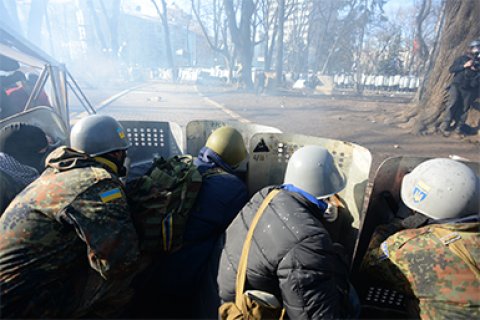Conflict Studies Group
The Conflict Studies group focuses on the dynamics of contemporary violent conflicts and collective violence. It aims to unravel the complexity of the web of relations and alliances producing contemporary war and violence, and the ways clusters of conflict cross-infect and exacerbate each other.

We combine open source investigation with ethnographic fieldwork in areas ranging from Iraq, Syria, Afghanistan, Israel-Palestine, South-Africa, Ukraine, former Yugoslavia, Colombia and El Salvador to the US, France and the Netherlands, drawing on a variety of academic disciplines such as anthropology, political sociology, international relations, history and critical political economy. We depart from an understanding of violent conflict and war not so much as an outcome with clear causes, but as social phenomena which are mutating and unstable.
Our researchers are involved in a range of projects on:
- Non-state armed actors: unravelling the governance and mobilisation of gangs, militias, and paramilitaries.
- Remote warfare and new technologies of violence: critically analysing the role of interventions by advanced (Western) militaries and the way these impact civilian harm and blowback.
- Urban violence and policing: studying the interplay between structural urban inequalities, police discrimination/brutality and civil unrest.
- Cyber conflict and information warfare: exploring the ‘making of’ war and security in/through cyberspace, the role of information manipulation during violent conflict, and the emergence of hybrid threats.
- The Weaponization of the Environment: how ecological issues and challenges impact or are impacted by violent conflict and injustices
Our research is closely linked to the educational minor in Conflict Studies and Master's programme in Conflict Studies and Human Rights
- Violence, Terrorism and Political Violence, Civilian-Military Relations, Conflict and Mediation
- Colonial History, Military History, Transnational History, Violence, Terrorism and Political Violence, Civilian-Military Relations, Africa
- Central America, Armed Conflict, Conflict Studies, History of International Relations, International Politics
- Cyber conflict, Cyber Security, Cyber Warfare, Israeli-Palestinian conflict, Conflict Studies, Disinformation, Artificial Intelligence, Internet Governance
- Theories of Violence, Armed Conflict, Remote Warfare, Institutions in Times of Large-Scale Violence, Conflict Studies, War Studies, Conflict Solution
- Militias, Insurgency, Research Methods
- Conflict Studies, Remote Warfare, Hybrid Warfare, Civilian-Military Relations, Autonomous Weapon Systems, Civilian Harm, Framing Violence
- Civilian-Military Relations, Conflict Studies, Military History, Transitional Justice, Identity, Ethics, Political Ecology, War Studies
- Political Ecology, Conflict Studies
- Conflict Studies, State-Society Relations, Economic Sanctions and Civilian Harm, Post-conflict Reconstruction, Humanitarian Aid and Humanitarian Access Negotiations, Syria
- War Studies, Post-conflict, Research on Governance Systems for Sustainability in Business and in Global Supply Chains, History of International Relations
- Conflict Studies, Urban Violence, Riots, Police Work, Ethnographic Fieldwork, Violence
- Conflict Studies, Hybrid Warfare, Remote Warfare
- War Crimes and Mass Violence, Accountability and Justice, Transitional Justice, Paramilitary Units, Perpetrator Studies
- Sociology, Conflict Studies, Human Rights, Violence, Terrorism and Political Violence, Qualitative Research


